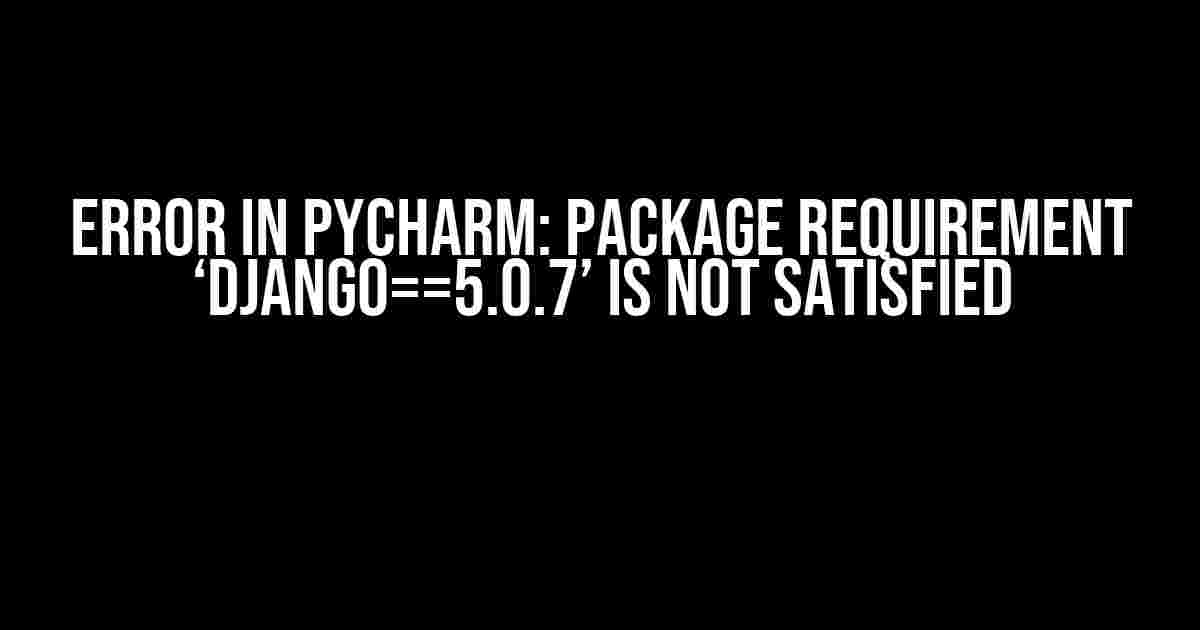Are you tired of staring at the frustrating error message “Error in PyCharm: Package requirement ‘Django==5.0.7’ is not satisfied” in your PyCharm IDE? You’re not alone! This error can be a showstopper for many developers, especially those new to Django or Python. But fear not, dear reader, for we’ve got the solution to this pesky problem right here.
What is the error all about?
Before we dive into the solution, let’s take a step back and understand what this error means. When you see this error, it’s usually because PyCharm is having trouble finding the specific version of Django (in this case, 5.0.7) that your project requires. This could be due to a variety of reasons, such as:
- Django not being installed in your virtual environment
- Incorrect version of Django installed
- Package dependencies not being met
Now that we’ve identified the possible causes, let’s get to the fun part – fixing the error!
Solution 1: Check your virtual environment
The first step in solving this error is to ensure that you’re using a virtual environment. A virtual environment is a self-contained Python environment that allows you to isolate dependencies for your project. If you’re not using a virtual environment, create one now!
python -m venv myenv
Activate your virtual environment:
source myenv/bin/activate
(On Windows, use `myenv\Scripts\activate` instead)
Solution 2: Install Django
Next, make sure you have Django installed in your virtual environment. You can do this by running the following command:
pip install django==5.0.7
If you’re using a requirements.txt file, ensure that it includes the correct version of Django:
Django==5.0.7
Solution 3: Check package dependencies
Sometimes, package dependencies can cause conflicts that lead to this error. To check for package dependencies, run the following command:
pip check
This command will scan your virtual environment for any package conflicts or issues. If you find any conflicts, try uninstalling and reinstalling the conflicting packages.
Solution 4: Invalidate PyCharm cache
PyCharm has a cache that can sometimes cause issues like this. Try invalidating the cache by going to:
File > Invalidate Caches / Restart…
This will clear out any cached data and force PyCharm to re-index your project.
Solution 5: Check project settings
Another common cause of this error is incorrect project settings. Make sure your project settings are configured correctly:
Go to File > Settings > Project: [your_project_name] > Project Interpreter
Ensure that the correct Python interpreter is selected and that the Django package is installed.
Solution 6: Reinstall PyCharm
If all else fails, you can try reinstalling PyCharm. This might seem drastic, but it can often resolve issues like this.
Troubleshooting tips
Here are some additional tips to help you troubleshoot this error:
- Check your Django version by running
django-admin --version - Verify that your virtual environment is activated by running
which python - Check for any typos in your requirements.txt file
- Try deleting the
.ideadirectory and re-opening your project in PyCharm
Conclusion
And that’s it! With these solutions and troubleshooting tips, you should be able to fix the “Error in PyCharm: Package requirement ‘Django==5.0.7’ is not satisfied” error. Remember to stay calm, follow the steps carefully, and don’t be afraid to try different solutions until you find the one that works for you.
| Solution | Description |
|---|---|
| Check virtual environment | Ensure you’re using a virtual environment and that it’s activated |
| Install Django | Install Django 5.0.7 in your virtual environment |
| Check package dependencies | Run pip check to identify any package conflicts |
| Invalidate PyCharm cache | Clear out PyCharm cache to resolve any indexing issues |
| Check project settings | Verify that project settings are configured correctly |
| Reinstall PyCharm | Reinstall PyCharm as a last resort |
By following these steps, you’ll be well on your way to resolving this pesky error and getting back to coding with PyCharm and Django.
Happy coding!
Frequently Asked Question
The infamous “Package requirement ‘Django==5.0.7’ is not satisfied” error in PyCharm – don’t worry, we’ve got you covered!
Q1: What causes the “Package requirement ‘Django==5.0.7’ is not satisfied” error in PyCharm?
This error typically occurs when PyCharm can’t find the specified version of Django (in this case, 5.0.7) in your project’s virtual environment. It might be due to an incorrect Django version installation, corrupted virtual environment, or even a simple typo in your `requirements.txt` file.
Q2: How do I resolve the “Package requirement ‘Django==5.0.7’ is not satisfied” error in PyCharm?
To resolve this issue, try the following steps: 1) Make sure you have the correct Django version installed by running `pip install Django==5.0.7` in your terminal. 2) Check your `requirements.txt` file for any typos or incorrect versions. 3) If you’re using a virtual environment, try activating it and then installing the required packages. 4) If all else fails, try reinstalling PyCharm or contacting their support team.
Q3: Can I ignore the “Package requirement ‘Django==5.0.7’ is not satisfied” error in PyCharm?
While it’s possible to ignore the error, it’s not recommended. Ignoring the error might lead to compatibility issues or unexpected behavior in your project. Instead, take the time to resolve the issue and ensure you have the correct Django version installed.
Q4: Why does PyCharm require a specific Django version?
PyCharm requires a specific Django version to ensure compatibility and optimal performance. Each Django version has its own set of features, bug fixes, and dependencies, so using the correct version is crucial for your project.
Q5: How can I avoid the “Package requirement ‘Django==5.0.7’ is not satisfied” error in PyCharm in the future?
To avoid this error in the future, make sure to: 1) Use a consistent virtual environment for your project. 2) Regularly update your `requirements.txt` file with the correct package versions. 3) Verify the package versions before running your project. 4) Keep your PyCharm and Python versions up-to-date.
